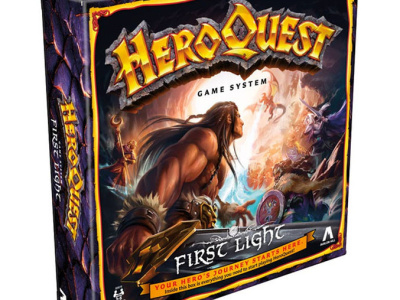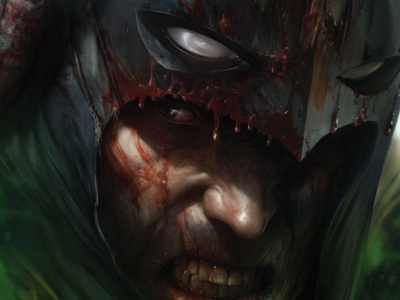
ICv2 talked recently with IDW Publishing CEO and President Ted Adams. In Part 1 of the interview he talks about the state of the market, the fact that digital has become a significant part of the publisher’s business, the effect of increasing digital sales on print sales, and digital pricing. In Part 2 Adams talks about his new position at the company, IDW’s varied product mix and some of the publisher’s major initiatives for 2012. I n Part 3 Adams comments on IDW’s approach to Judge Dredd, other key licensed titles like Star Trek and the Teenage Mutant Ninja Turtles, as well as the fate of the Locke & Key TV series.
In the announcement for IDW having a new president (you remain CEO and Publisher), you said your role will be changing to focus more on new markets and potential acquisitions. Can you tell us what that means?
One of the things we want to do as a business, like all businesses, is figure out which ways to grow. We have a couple of new divisions that we’re going to be launching this year that I’ve taken a hands on approach with. Unfortunately I’m not at a spot where I can announce either of them, but we’ve got two big initiatives that we’re going to launch this year.
That’s internal growth, and then we’ve been trying to figure out a way to grow by acquisition--looking at some of the other publishers in our marketplace and publishers in different marketplaces to see if there’s some opportunity to grow that way as well.
A year ago when we talked you had four imprints (Library of American Comics, Yoe Books, Desperado, ComicsMix) as well as the core IDW brand, is that still the case?
There’s not a whole lot going on with the ComicsMix (not that we wouldn’t want to do it); I don’t think we’ve published anything by them in the last year or so.
We don’t identify it as a separate division but we do have a prose book division. We’ve done a handful of titles, a Zombies vs. Robots prose anthology and we’ve done some books with Les Klinger as a co-editor: In the Shadow of Dracula and In the Shadow of Sherlock Holmes. Basically those are stories that came out around the same time as those books came out, a collection of prose stories.
We’ve done a couple of other things. We have a book coming out in the next month or so call V Wars, which is a shared world anthology by Jonathan Maberry--he’s sort of the consulting editor on that book and also wrote one of the stories.
How’s the mix changed over the last year between your different types of products--original creator-driven material, movie and TV licenses, strips and celebrations of older work?
It’s pretty stable. One of the things that we’re pretty proud of is that we’re a diverse publisher. We generally have great success with our licensed books. Teenage Mutant Ninja Turtles worked for us in an unbelievable way; Magic: The Gathering did really well for us. I mentioned before the Transformers re-launch, which exceeded our expectations. We’ve actually got a Popeye comic book coming out this week and the pre-orders on that were much better than we expected. The licensed brands have been doing well for us--Ghost Busters, Star Trek--those re-launches also worked really well for us. Our licensed titles are doing well.
In a couple of months we'll also see the release of the third Parker adaptation, The Score, by Darwyn Cooke. I've had a chance to read the first two chapters and it's as good as you'd expect.
On the creator owned side, we of course have Locke and Key which is sort of our crown jewel at this point. That book does great for us as a comic book, but does just unbelievably well in the collected editions. Locke and Key is one of things I’m most proud of publishing. It’s been nice to see that have good sales success. It really feels like, in this case, that quality is being rewarded with sales.
We also have a couple of books launching in a couple of weeks. We have a John Byrne superhero book--Trio. We have Bernie Wrightson reunited with Frankenstein in a book written by Steve Niles called Frankenstein Alive, Alive, and both of those books had strong preorders.
We’ve also got Memorial with Chris Roberson, Smoke and Mirrors, we’re doing 30 Days of Night. We have a book that we’re doing called Night of A Thousand Wolves, written by one of the editors here at IDW, so we really have a diverse creator owned line.
We have that nice mix and certainly all the books we do with Library of American Comics. I mentioned Flash Gordon, the second Alex Toth book, Genius Isolated, is going to come out this year. We’ve got Steve Canyon coming out regularly; X-9 Secret Agent Corrigan, all under Library of American Comics. Then we have the books we do with Craig Yoe under his brand. We just got an advance copy of his latest book which is a collection of zombie comics called The Chilling Archives of Horror Comics.
We have our Artist Edition line which has done unbelievably well for us this year. The next book coming out there is David Mazzucchelli doing Daredevil Born Again, which I just saw a proof of. That book is going to absolutely blow peoples’ minds. I think we really surprised people with the success of the Artist Edition that we did with Wally Wood. The consumer demand for that book was significantly larger than retail expected and caused us to go back on press on a book that we never thought we’d go back to press on. I think the Daredevil book is truly a work of art.
How many Artist Edition releases do you plan to put out per year?
That’s a good question but I don’t think I want to commit to a number on that at this point. I was just having that conversation with Scott Dunbier. The Artist Editions were his brainchild and he’s the guy who runs the bus for us on those books. It’s a conversation that’s ongoing for us.
We were concerned that there may be a sort of market saturation on how many we could do. I’m not sure we have those same concerns. I’m not saying that we’re going to do one a month, but the market seems to be a little bigger for great material.
You mentioned Magic: The Gathering, the license from Wizards of the Coast. What have you learned about publishing for the game market and how that will affect your plans?
I saw your Website today that Hasbro announced that Magic sales were up a pretty astonishing amount. Clearly Magic is giant brand and has a really loyal fan base. We knew the Magic comics were going to do well, but with that said, they’ve done better than we expected.
I think it opens opportunity to think about other brands within that space that makes sense, but the reality is that Magic has always been the unique game in that space. Everyone’s always aspired to be Magic, but there’s only one Magic, so I don’t necessarily thing that success with Magic means success with a third tier trading card game.
Click here for Part 3.







